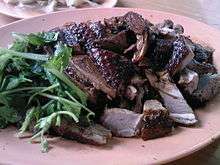"Magret" redirects here. For the wine grape also known as Magret, see
Malbec.
Duck (aka duckling) refers to the meat of several species of bird in the family Anatidae, found in both fresh and salt water; a species of freshwater duck, the mallard, has been domesticated and is a common livestock bird in many parts of the world. Duck is eaten in various cuisines around the world.
Types of ducks
The most common duck meat consumed in the United States is the Pekin duck. Because most commercially raised Pekins come from Long Island, New York, Pekins are also sometimes called "Long Island" ducks, despite being of Chinese origin. Some specialty breeds have become more popular in recent years, notably the Muscovy duck, and the mulard duck (a sterile hybrid of Pekins and Muscovies).[1] Unlike most other domesticated ducks, Muscovy ducks are not descended from mallards.
Duck is particularly predominant in the Chinese cuisine — a popular dish is Peking duck, which is made from the Pekin duck. They are commonly eaten with scallions, cucumbers and hoisin sauce wrapped in a tortilla-like pancake made of flour and water or a soft, risen bun known as gebao (割包).
According to the USDA, nearly 26 million ducks were eaten in the U.S. in 2004.
Duck meat
Duck meat is derived primarily from the breasts and legs of ducks. The meat of the legs is darker and somewhat fattier than the meat of the breasts, although the breast meat is darker than the breast meat of a chicken or a turkey. Being waterfowl, ducks have a layer of heat-insulating subcutaneous fat between the skin and the meat.
De-boned duck breast can be grilled like steak, usually leaving the skin and fat on. Magret refers specifically to the breast of a mulard or Barbary duck that has been force fed to produce foie gras.[2]
Internal organs such as heart and kidneys may also be eaten; the liver in particular is often used as a substitute for goose liver in foie gras.
Dishes
Duck is used in a variety of dishes around the world, most of which involve roasting for at least part of the cooking process to aid in crisping the skin. Notable duck dishes include:
- Bebek Betutu – a famous traditional dish from Bali, Indonesia. The duck is first seasoned with pungent roots and various herbs, wrapped with banana leaves, and roasted. Chicken is also used to prepare Betutu.
- Confit – duck legs that have been cured (partly or fully) in salt, then marinated and poached in duck fat, typically with garlic and other herbs. The French word confit means "preserved", and the French name for duck confit is "confit de canard."
- Czernina – a sweet and sour Polish soup made of duck blood and clear poultry broth. It was once considered a symbol of Polish culture until the 19th century, customarily served to young men and is even featured as a plot device in a famous epic poem called Pan Tadeusz.
- Duck à l'orange – a classic French dish in which the duck is roasted and served with an orange sauce.
- Foie gras – a specially fattened and rich liver, or a pâté made from the liver, sometimes taken from a duck but usually from a goose.
- Long Island roast duckling – this is a whole roasted bird, sometimes brined previously. When done properly, most of the fat melts off during the cooking process, leaving a crispy skin and well-done meat. Some restaurants on Long Island serve this dish with a cherry sauce.
- Oritang – a variety of guk, Korean soup made with duck and various vegetables.[3]
- Peking duck – a famous Chinese dish originating from Beijing, prepared since the Ming Dynasty era. It is prized for the thin, crispy skin, with authentic versions of the dish serving mostly the skin and little meat, and eaten with pancakes, scallions, and hoisin sauce or sweet bean sauce.
- Pressed duck – a complex dish originally from Rouen, France.
- Turducken: an American dish that comprises a turkey, stuffed with a duck, which is in turn stuffed with a chicken.
- Zhangcha duck – a quintessential dish of Sichuan cuisine. It is first prepared by smoking a marinated duck over tea leaves and twigs of the camphor plant, then steamed, and finally deep fried for a crisp finish. Also called tea-smoked duck.
Pollution
Ducks caught in the wild may be contaminated from pollution of rivers and other bodies of water, because they eat fish and other aquatic life. In particular, PCBs may pose a health risk for those who eat wild duck frequently.[4]
References
- Rombauer, Irma S., et al. Joy of Cooking, Scribner, 1997. ISBN 0-684-81870-1.
External links
 |
Wikimedia Commons has media related to duck meat. |
 |
Wikimedia Commons has media related to duck eggs. |
 |
Wikibooks Cookbook has a recipe/module on
|
|
|---|
| | | Poultry and
game | | |
|---|
| Livestock and
Minilivestock | |
|---|
| Fish and
seafood | |
|---|
| Cuts and preparation,
precooked | |
|---|
| | List articles | |
|---|
| Related
Subjects | |
|---|
|




